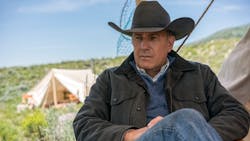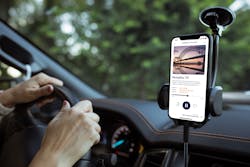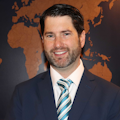Autio app puts Kevin Costner, other storytellers in the cab
America is a place of tall tales and longer roads, as long-haul truckers know best. They also know how lonely a cab can get on those endless days and nights for weeks at a time. Those barren stretches of asphalt don’t have much to say. But the land all around still clutches onto whispers of history—stories both barely remembered and the kind many want to forget. The odd legend about an indestructible grizzly in Utah, the unbelievable encounter between a president’s son and the brother of his assassin, and the tragically repeating account of what became of the First People to live here.
They’re all part of the American myth and its reality, and a software startup called Autio, (formerly HearHere) is amplifying those whispers with its geolocation-based smartphone storytelling app. Listeners are provided vignettes into America’s past while they drive through the area in which the historical events occurred.
Available now for iOS and soon for Android, HearHere labeled the app as a Road Trip Companion, and it’s a perfect gift for long-haul truckers to keep them alert and engaged as they travel the country.
The app, which has a 4.9 out of 5 rating on Apple's App Store, alerts the user based on location to stories they haven’t heard and goes away when the story concludes. It’s like picking up an affable hitchhiker who spins a good yarn about the locale and then hops out before overstaying their welcome.
Maybe the snifter of distilled history is a geology lesson, a ghost story, or maybe it’s just John Lithgow talking about Kansas City barbecue. There are roughly 9,000 stories (and growing all the time), usually 3 to 5 minutes in length, and they span the contiguous United States.
Co-founders include former North Face and Patagonia executive Bill Werlin, accomplished iOS developer and entrepreneur Woody Sears, and Kevin Costner (a former truck driver), who brings to the venture his hefty expertise in history and crafting narratives, as well as his gravitas and gritty voice to their narration.
“The compelling thing was Woody and Bill as being just thoughtful people who just felt capable of shepherding this idea,” said Costner, who came on board after his wife learned of the concept from Sears’ wife.
The "Yellowstone," "Dances With Wolves," and "Field of Dreams" star has an affinity for U.S. history, sports, and native culture, which are a few of the eight categories the app offers. He also can’t help himself when he passes a historical marker, much to the chagrin of his children. To Costner, these audio stories are just more rich versions of those roadside bronze plaques.
"When we started working with Kevin, I was very impressed with his just depth of knowledge about the history of our country, and really just how much insight he had into that, and how much he cared about it," Sears recalled of early discussions with Costner.
“It’s more than just entertainment while you drive, but entertainment about your drive,” explained Sears, who also serves as CEO. “HearHere was really born out of a love of travel and road-tripping, and always wanting to learn more about the places we were driving through.”
The narrations can feel like the CliffsNotes version of a college class, (or for those who remember life before the internet, a Paul Harvey "The Rest of the Story" segment).
"There's not a lot of fluff in our story," Sears agreed. "You do get a lot of content in those three to five minutes, and really walk away feeling smarter.
The subscription-based app has 100,000 users, and Sears said 90% of users would recommend it.
Plenty of engaging storytellers have contributed to the library, which is open to anyone who has a good story to tell.
One of Werlin’s favorites came from historian Andrew Carroll:
“He gave us a story about a commuter station in New Jersey. In the late 1860s, a young man fell down in front of an incoming train and another fellow reached down, grabbed him, and helped him get out of the way of that oncoming train. The young fellow that fell in front of the train was Abraham Lincoln's son; the fellow that pulled him out: John Wilkes Booth's brother, Edwin Booth, who was a very famous actor in that area at that time. You can't make this stuff up.”
One of the side benefits of editing and readying all that content is that Werlin would be quite the get at a cocktail party.
“It's a completely hands-free experience, and it does work well with other apps, whether you listen to music, podcasts, audiobooks, or the radio.”
The biggest difference is that, unlike a podcast or song, these stories bind you to the land while you keep on moving toward your destination. Every story is also accessible on the app to listen to any time, so a truck driver could receive a college-level history lesson while detained at a shipper or during an hours-of-service break.
“There are some phenomenal minds out there creating these podcasts, but what we're intending the app to be used for is on the road traveling—moving into the next area so there's something new coming at you,” said Werlin, who came up with the original concept.
Werlin’s grandfather would serve as his omniscient narrator as they drove through Colorado in the 1960s on work/family bonding trips.
“I just had this constant litany of information coming from the passenger seat,” Werlin recalled of his grandfather, the director of Colorado penal institutions at the time, who before that was a rancher and hard rock miner. “He had an amazing amount of wisdom about how a town got its name, special places of interest in the immediate vicinity, and could give me incredible information on the geology—he could look at the mountainside with mine dumps running up and tell me where the likely positioning of the vein was.”
Werlin wished he had some company as a ski equipment salesman in the 1980s driving five hours at a time between Vail, Aspen, and other peak powder towns in the Rocky Mountains, where he learned the meaning of vehicular solitary confinement.
That’s why he believes the app will catch on big with truckers, a captive audience he always thought would appreciate it for the knowledge, entertainment, and most of all, company.
“I certainly can't claim that I've been on the road as long as the long-distance haulers—it's an amazing group of people that does that,” he noted. “But I do know those long drives and how fatiguing and how tired you get on them. And how you're looking for things to keep you interested and alert as you're traveling.”
HearHere said it would offer fleets discounted prices for the app, priced regularly at $35.99 for a one-year subscription. FleetOwner currently has a driver testing the app out on the roads and will provide a follow-up.
Legacy preservation
Costner, who won Best Actor, Director, and Best Picture at the 1991 Academy Awards for "Dances with Wolves," made it a point to bring to light what America was like prior to Conquistadors and Pilgrims.
“If we did not offer up what occurred with the First People, I wouldn't have been involved with this,” Costner told FleetOwner. He said this wasn’t a move to appear “really thoughtful” to the masses, but because “it would be dishonest to not talk about what's here, without trying to understand what was here before first contact."
“The outcome was never good,” he continued. “And I just think that we don't need to be afraid of that history. But we should be embarrassed if we're not willing to talk about what really [happened]. It's why we can be uninformed.”
Costner’s primary mission at HearHere is to combine tribes’ oral histories with anthropological and archaeological evidence to tell the full story “in an unflinching way.”
“The truth will always be more interesting than the lie—and HearHere gives us the opportunity to reveal it,” he wrote on the site’s blog.
The exploits and exploitation of California’s indigenous tribes, such as the Chumash or Ohlone, can’t be told in the prototypical short-form fashion.
“The idea was we do these three-minute stories,” Costner recalled. “I said, ‘Listen, I can't do that. Haven't you seen my movies?’”
Ultimately, Costner sees HearHere as a way to preserve America’s legacy, which starts with the First People but carries on with pioneers, war heroes, and immigrants who would be fleeced by thieves as soon as they were processed through Ellis Island.
Part of that preservation is getting more contributors to take ownership of their own histories and share more obscure stories that could be saved rather than fade from existence.
“When you go into a hotel with great black-and-white pictures, they can only find so many,” he explained. “But if they actually go out into the community and say, ‘Do you want to be a part of the museum?,’ all of a sudden, it can get very expansive and shots no one ever even dreamed of start to emerge. How clever can we be to raise these stories before they're lost forever?”
About the Author
John Hitch
Editor
John Hitch is the editor-in-chief of Fleet Maintenance, providing maintenance management and technicians with the the latest information on the tools and strategies to keep their fleets' commercial vehicles moving. He is based out of Cleveland, Ohio, and was previously senior editor for FleetOwner. He previously wrote about manufacturing and advanced technology for IndustryWeek and New Equipment Digest.


